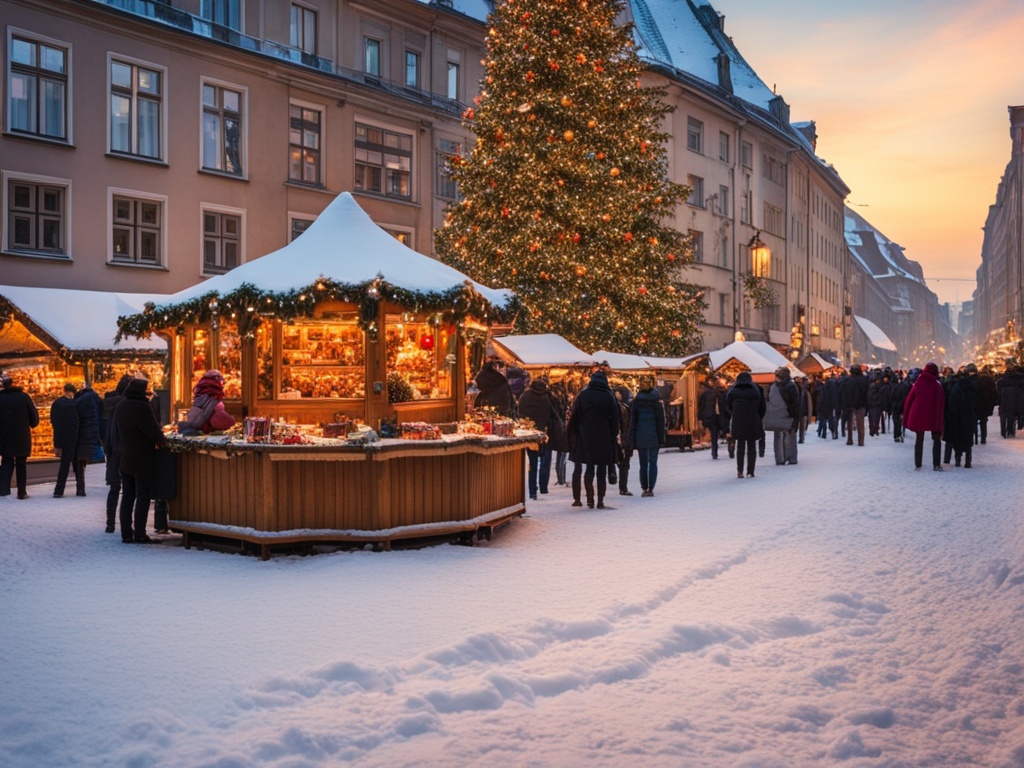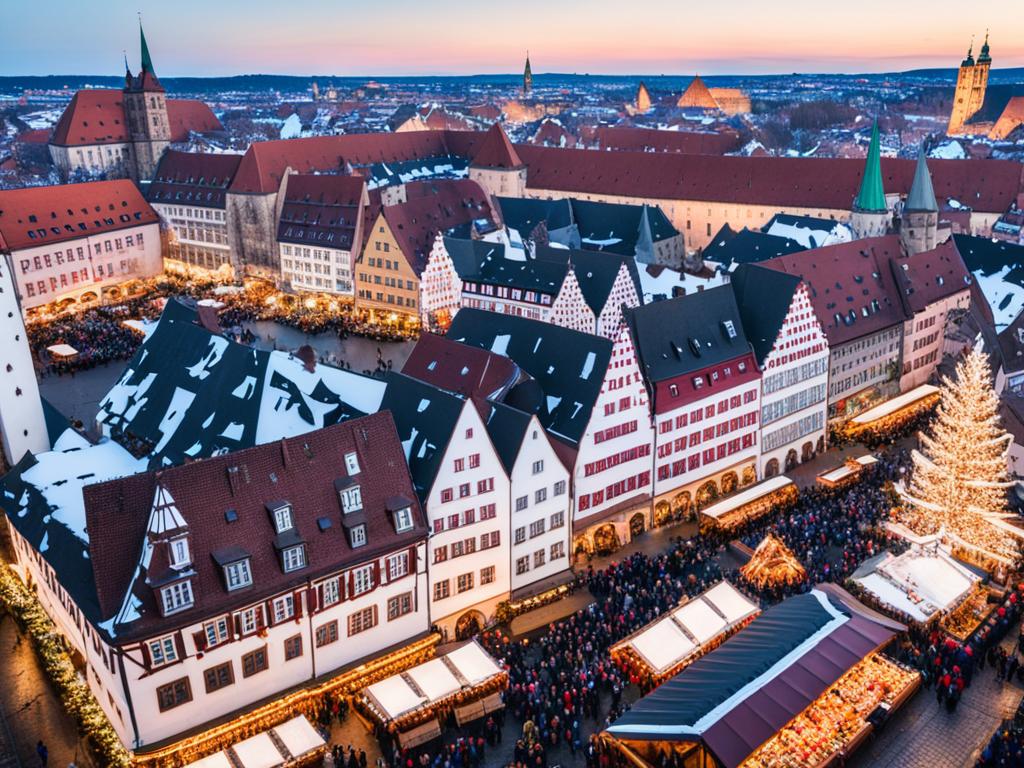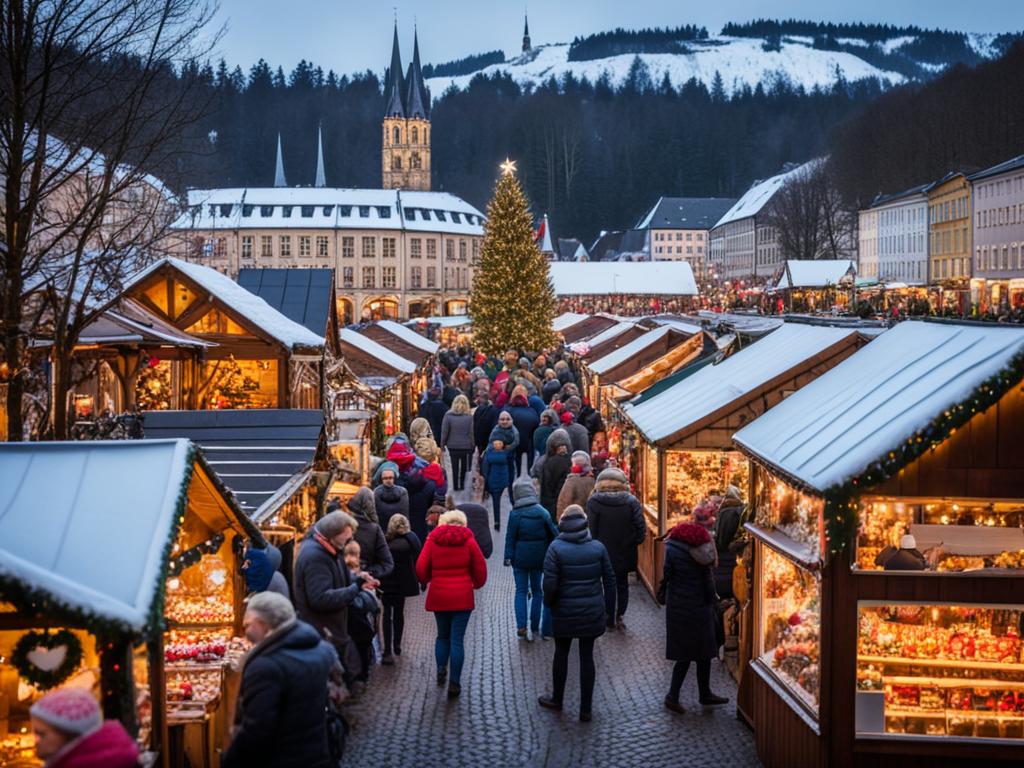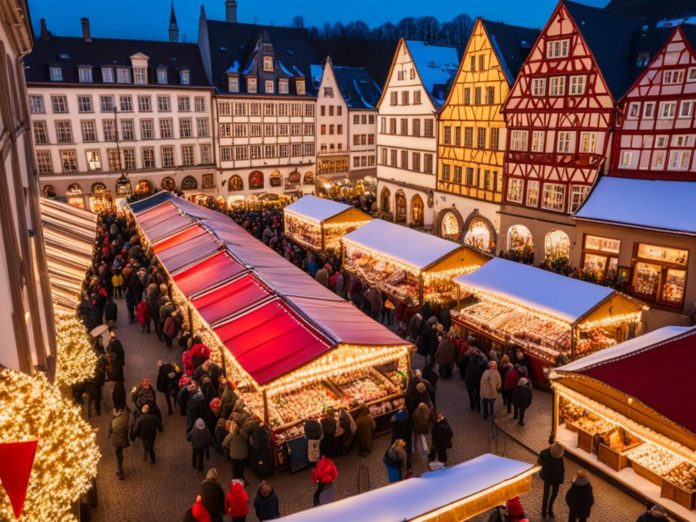Christmas markets in Germany are a key part of the holiday season. They offer a magical experience with traditional crafts, festive food, and hot mulled wine. These markets are set up in town squares and historic city centers, surrounded by a large Christmas tree and twinkling lights.
Visitors can enjoy carols and holiday entertainment. The Nuremberg Christkindlesmarkt and the historic Striezelmarkt in Dresden are famous examples. These markets have been a tradition for centuries, drawing millions of visitors every year.
Key Takeaways
- Germany hosts hundreds of Christmas markets across the country, especially in cities and towns with tourist attractions.
- Nuremberg’s Christkindlesmarkt on the Hauptmarkt is the largest Christmas market in Germany.
- Berlin boasts at least one Christmas market in each of its 12 districts, offering a diverse range of holiday experiences.
- Cologne features six unique Christmas markets, each with its own distinct character and offerings.
- Dresden’s market includes unique wooden folk art from the nearby Erzgebirge region, showcasing the region’s rich craftsmanship.
Enchanting Holiday Traditions
The spirit of German christmas markets comes alive with sights, sounds, and traditions during the holiday season. Visitors are welcomed by the smell of gingerbread, chestnuts, and mulled wine. They hear choirs, brass bands, and children laughing.
These festive markets offer handcrafted ornaments, wooden toys, and unique gifts. They show off Germany’s rich cultural heritage. Events like the Christmas angel crowning and Advent calendars fill the air with wonder and celebration.
The Spirit of Christmas Markets
The christmas market atmosphere delights all senses. You’ll smell treats, hear holiday tunes, and see twinkling lights and decorated stalls. There’s a wide range of traditional german holiday crafts to explore, from wood carvings to glass ornaments.
A Glimpse into History
German christmas markets go way back to the late Middle Ages. The first one was in Dresden in 1434. They started as places to buy holiday supplies and grew into lively spots of holiday cheer.
Markets like the Nuremberg Christkindlesmarkt and the Striezelmarkt in Dresden have been around for centuries. They keep the tradition alive with their crafts, foods, and festivities.

“The german christmas traditions and the holiday sights and sounds of the markets transport visitors to a magical winter wonderland.”
Iconic Christmas Markets
Germany is famous for its magical Christmas markets, each with its own special charm. The Nuremberg Christkindlesmarkt and the Dresden Striezelmarkt are among the most iconic ones.
Nuremberg Christkindlesmarkt
The Nuremberg Christkindlesmarkt has been around since 1628. It’s one of Germany’s oldest and most famous Christmas markets. It takes place in the city’s main square, surrounded by beautiful medieval buildings.
Visitors can explore stalls filled with traditional German crafts. You’ll find Rauschgold angels, wooden nutcrackers, and detailed nativity scenes. The market is also known for its delicious treats like lebkuchen (gingerbread) and bratwurst sausages.
The market opens with a special ceremony. The Christkind, a young local woman dressed as an angel, makes an appearance. This event sets the mood for the holiday season.
Dresden Striezelmarkt
The Dresden Striezelmarkt is the oldest Christmas market in the world, starting in 1434. It’s held in the Altmarkt square and offers over 200 stalls. You can find traditional German goods like handcrafted ornaments and wooden toys.
There are also sweet treats like the famous Dresdner Stollen, a rich Christmas cake. You can enjoy the view from the Ferris wheel or check out the German Christmas pyramid. This wooden structure spins with the candles lighting it up.
The market is full of entertainment. You can enjoy choral performances or historical puppet shows. It’s a holiday experience you won’t forget.

Traditional Christmas Markets in Germany
Germany’s traditional Christmas markets are a special treat. They bring the holiday spirit to life. From big markets in cities like Nuremberg and Dresden to small town markets, they let you dive into German culture.
At these markets, you can find unique German crafts and gifts. Enjoy a warm glühwein while listening to festive music. It’s a magical way to feel the holiday cheer.
These markets have a long history and a lively festive atmosphere. They’re a key part of the German holiday season. Visitors love them for their authentic feel and traditions.
Traditional German Christmas markets open a week before the first Advent. They close just before Christmas Eve. The oldest markets started in the 14th and 15th century.
The Frankfurt Weihnachtsmarkt is one of the oldest, starting in 1393. It has 200 stalls and welcomes over 3 million visitors yearly. Other famous markets include Augsburg’s Christkindlesmarkt and Dresden’s Strietzelmarkt, known for its giant Christmas pyramid.
Nuremberg’s Christkindlesmarkt is another highlight. It has 180 stalls and is opened by a real “angel.” These markets draw visitors from all over the world.
As the holidays near, these traditional German Christmas markets become even more popular. They offer a special holiday shopping experience. It’s a celebration of Germany’s rich cultural traditions.

Conclusion
German Christmas markets are a key part of the holiday season. They offer a unique and magical cultural experience. From the historic Nuremberg Christkindlesmarkt to the charming Striezelmarkt in Dresden, these markets show off Germany’s rich traditions and festive spirit.
Visitors can enjoy the captivating sights and sounds, taste delicious treats, and find unique gifts. A visit to a traditional German Christmas market will leave a lasting impression. You’ll see why these markets are a beloved part of German Yuletide celebrations.
With over 1,400 Christmas markets across the country, each one has its own special touch. Visiting German Christmas markets is a must for anyone exploring holiday travel in Germany and wanting to experience traditional German holiday experiences.
These markets offer a break from the fast pace of modern life. They let people reconnect with tradition and feel the joy of the season. Whether you’re local or just visiting, a trip to a German Christmas market will enchant you. You’ll want to come back every year.
